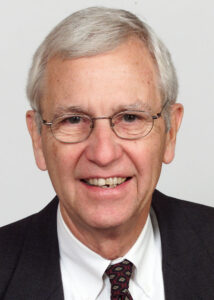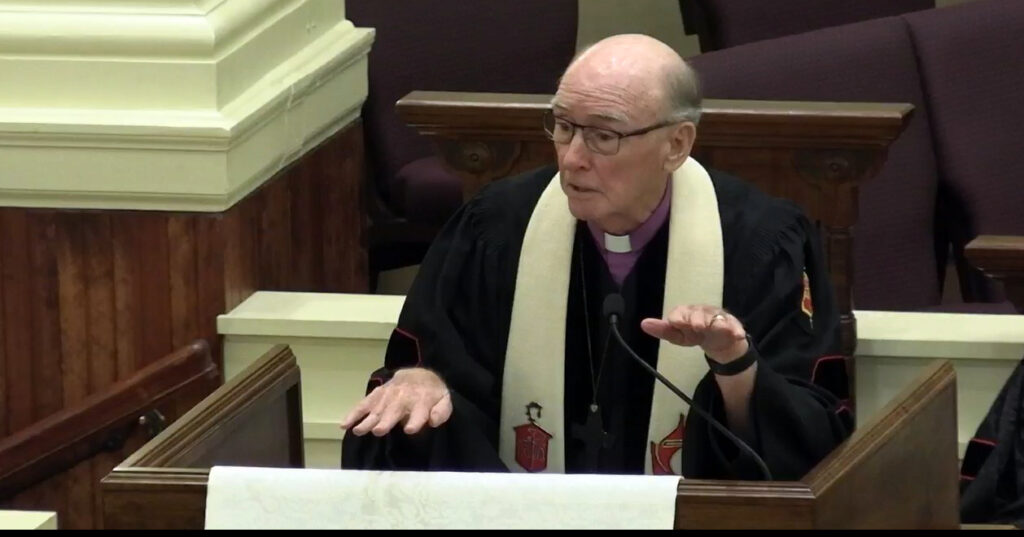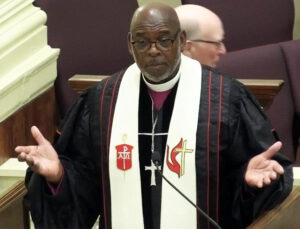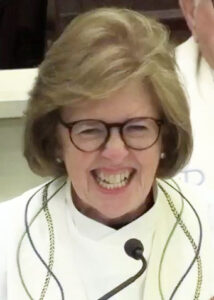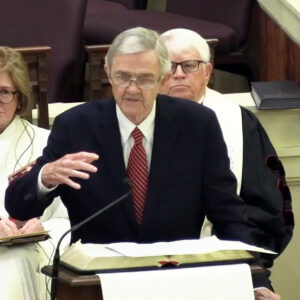ANDERSON – Bishop Marshall L. “Jack” Meadors Jr. personally selected the scriptures that were read at his memorial service June 9 at St. John’s United Methodist Church in Anderson – one of six South Carolina churches he pastored during his 71 years in ministry.
“He did choose the scriptures – or did the scriptures choose him?” asked his longtime friend, Bishop Kenneth Carder, who delivered the message during the service. “Long before Jack chose these scriptures, the God of these scriptures chose Jack and formed him so that these are not merely words on a page that we call Holy Scripture.
“They became the living word in Jack Meadors. They formed his life, his values, his way of relating. It was into God’s story that Jack was immersed and gave his life. We have witnessed one who has been formed by this God who practices justice, who loves kindness, who embraced faithful love and walking humbly.”
Bishop Meadors, a native of Kingstree who grew up in Florence, died May 25. He was 90.
Having graduated from Wofford College and the Candler School of Theology at Emory University, Bishop Meadors was ordained as an elder of The United Methodist Church in 1958. He would go on to pastor six churches in the South Carolina Conference – the McBee Charge, Trinity UMC-North Myrtle Beach; Berea Friendship UMC-Greenville; First UMC-Marion; St. John’s UMC-Anderson, and and Buncombe Street UMC-Greenville. He also served six years as the Columbia District superintendent.
In 1992, he was elected bishop and assigned to the Mississippi Annual Conference. He retired in 2000, and spent the remainder of his time on earth in the Anderson area.
Bishop Carder, a retired bishop living in South Carolina, recalled Bishop Meadors’ final public appearance, at the 2022 Southeastern Jurisdictional Conference at Lake Junaluska, North Carolina.
“He wanted so desperately to be there to lay his hands on the newly elected bishops,” Bishop Carder said. “Jack was in his wheelchair, now frail and not able to lift his hands to bless the new bishops…then I watched as people from South Carolina, from Mississippi, I watched as all the newly elected bishops came to him, and he held his hand out, and I saw the tears.
“He blessed them. Yes, he blessed them. He blessed them just by being.”
Bishop L. Jonathan Holston, resident bishop of the South Carolina Conference, thanked God “for the life of Bishop Meadors…for how how he has blessed our lives with his presence…for who he was to us and for what he believed.”
“We are grateful for who Bishop Meadors was,” he said, “and for the memories we will cherish as we go forward together.
“Bishop Meadors was well known for his compassion toward the vulnerable among us, especially the children. I am grateful for the support Bishop Meadors offered to me as I began serving in South Carolina. As the former chair of the Council of Bishops’ Initiative on Children and Poverty, Bishop Meadors was also a steadfast supporter of my ecumenical work with the Pan Methodist Campaign on Children in Poverty. His wisdom, faithfulness and deep commitment to building relationships for the furtherance of God’s kingdom exemplify the giant of a leader that he was.”
“Bishop Meadors impacted all of our lives,” Bishop Holston said. “He changed us for the better. And for that we give God the glory.”
The Rev. Dr. Susan Henry-Crowe, the recently retired general secretary of the General Board of Church and Society, told Bishop Meadors’ family and friends that “Jack asked me to remind you that he was arrested twice for justice.”
“On this day, we smile and rejoice in his love and devotion for his children and grandchildren, and for his wife Hannah, who has gone before him,” said Rev. Henry-Crowe, who served multiple South Carolina churches before her time with Church and Society. “We give thanks for his dedicated life in ministry as a pastor, administrator, public servant and a bishop in the church of Jesus Christ; for his special commitment to those on the margins and those who often are least able to speak for themselves.
“His commitment to justice – racial, economic, social, political – never swayed. His pleasure in serving the church and in the public sphere on behalf of children and migrants and refugees inspires in us a glimpse of what it is to live a Christian life and a faith of witness.”
Bishop Meadors indeed was arrested twice for non-violent disobedience – once for protesting the United States’ involvement in the war in Iraq, and again when he and 100 other faith leaders demanded more humane immigration policies, especially for children.
The Rev. Dr. Thomas Summers, a friend of Bishop Meadors since they met at Wofford College more than 70 years ago, was with Bishop Meadors during the anti-war protest in Washington D.C. But what struck him most was something that happened before they got to the nation’s capital.
“It was about 20 years ago, we met in a parking garage in Columbia before riding a bus with some others from Charleston,” Rev. Summers recalled. “We were about to leave the garage when Jack noticed a rather disheveled man, no doubt homeless, off in a dark corner of the garage. Jack walked over him and handed him the blanket he was planning to carry on the bus ride to Washington.
“I heard Jack say to him, ‘I’ll be thinking about you.’ I wonder how many people Jack ministered to and then said, ‘I’ll be thinking about you’?”
As a bishop, Rev. Summers said, “Jack fought courageously for human rights in so many areas – whether it was immigration, anti-war protests, education, the LGBTQ community, Medicaid expansion – Jack was always there up front, giving a voice.
“He never saw people who might have a different view as he had as enemies, but as fellow human beings and as neighbors. He had taken the advice of John Wesley who once said, ‘Though we may not think alike, let us love alike.’ That’s powerful stuff for this day and time.”
Rev. Summers also shared the words of American poet Mary Oliver, “I don’t want to end up simply having visited this world.”
“Jack did not simply visit this world of ours, but he gave so much of his life to it. He was out to make the world a better place, especially for those who were vulnerable to discrimination, so they might feel acceptance and hope. In that respect he was a unique and special gift-giver in his ministry and who he was as a person.”
